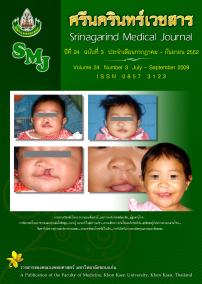ThaiScience
ThaiScience
SRINAGARIND MEDICAL JOURNAL
Volume 35, No. 04, Month JULY, Year 2020, Pages 463 - 469
Effects of a 2-week home-based strength training associated with task-oriented training to upper limb function activities in patients with chronic stroke
Olan Isariyapan, Jeerawan Kerdsawatmongkon, Natchaya Chondaen, Nomjit Nualnetr, Duangnapa Roongpiboonsopit, Waroonnapa Srisoparb
Abstract Download PDF
Background and objective: Muscle weakness is the main cause of upper limb function activities (ULFA) dysfunction, which is commonly found in stroke patients. Task-oriented training (TOT) and strengthening programs may improve ULFA. The purpose of this study was to investigate the effects of adding strength training to TOT in chronic stroke. Methods: A double blind, randomized controlled trial was conducted. Twenty chronic stroke patients were allocated to either home-based personalized strength training added to TOT (ST_TOT group, n=10) or TOT (TOT group, n=10). The participants in both groups received individualized training for 70 minutes, 5 times/week for a period of 2 weeks. Upper limb function, hand grip strength, and muscle tone were assessed by The Streamlined Wolf Motor Function test (chronic) (SWMFT-C), Hand grip dynamometer and Modified Ashworth Scale, respectively. Results: At the end of the 2-week training phase, the ST_TOT group showed statistically significant improvement in both SWMFT-C and hand grip strength (p<0.05), without any increase of muscle tone. No statistically significant differences were seen in the TOT group. However, when compared with between group were not statistically significant. Conclusion: Adding strength training to task-oriented training in patients with chronic stroke had statistically significant beneficial effects on ULFA and hand grip strength in 2 weeks
Keywords
Stroke Task-Oriented Training Upper Limb Functional Activities Muscle Strength Muscle ToneSRINAGARIND MEDICAL JOURNAL
Published by : Faculty of Medicine, Khon Kaen University
Contributions welcome at : http://www.smj.ejnal.com/e-journal/journal/index.php
